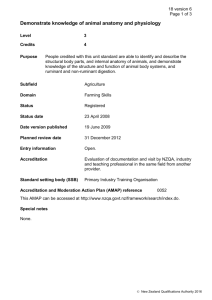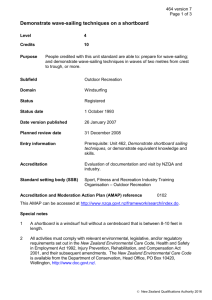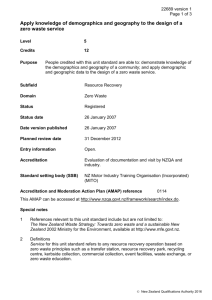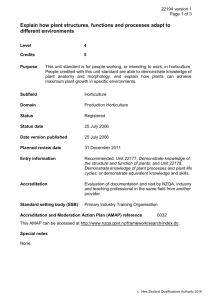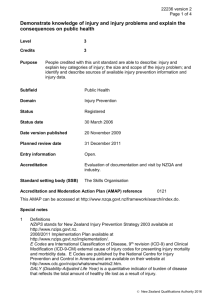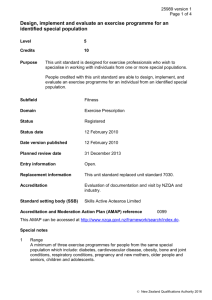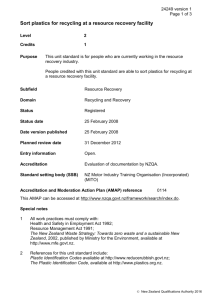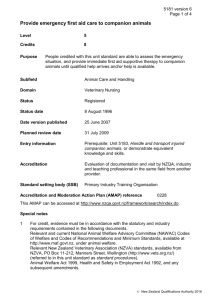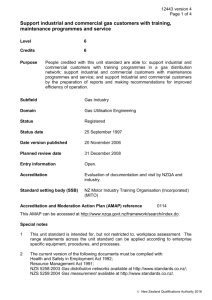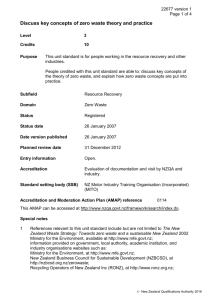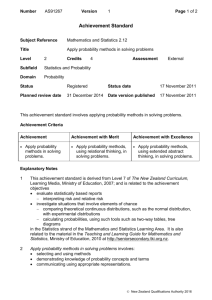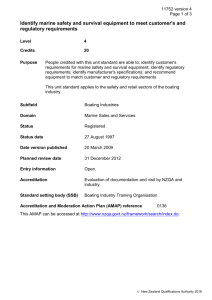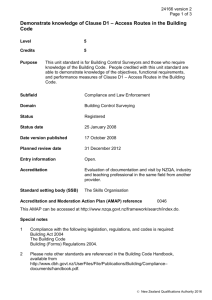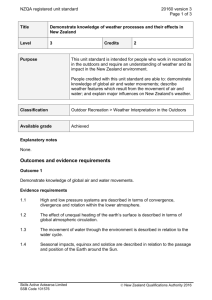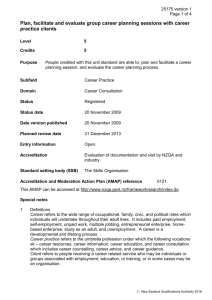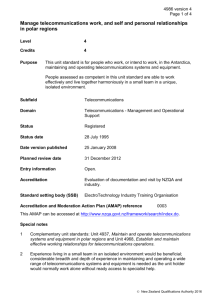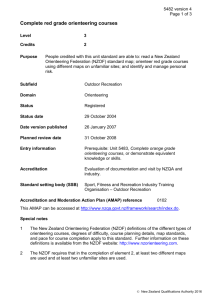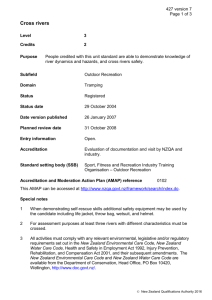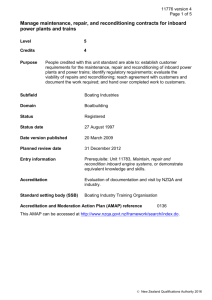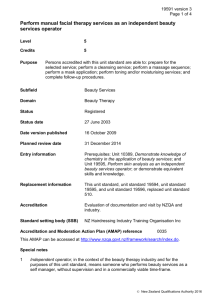7091 Facilitate adult learning in New Zealand`s
advertisement
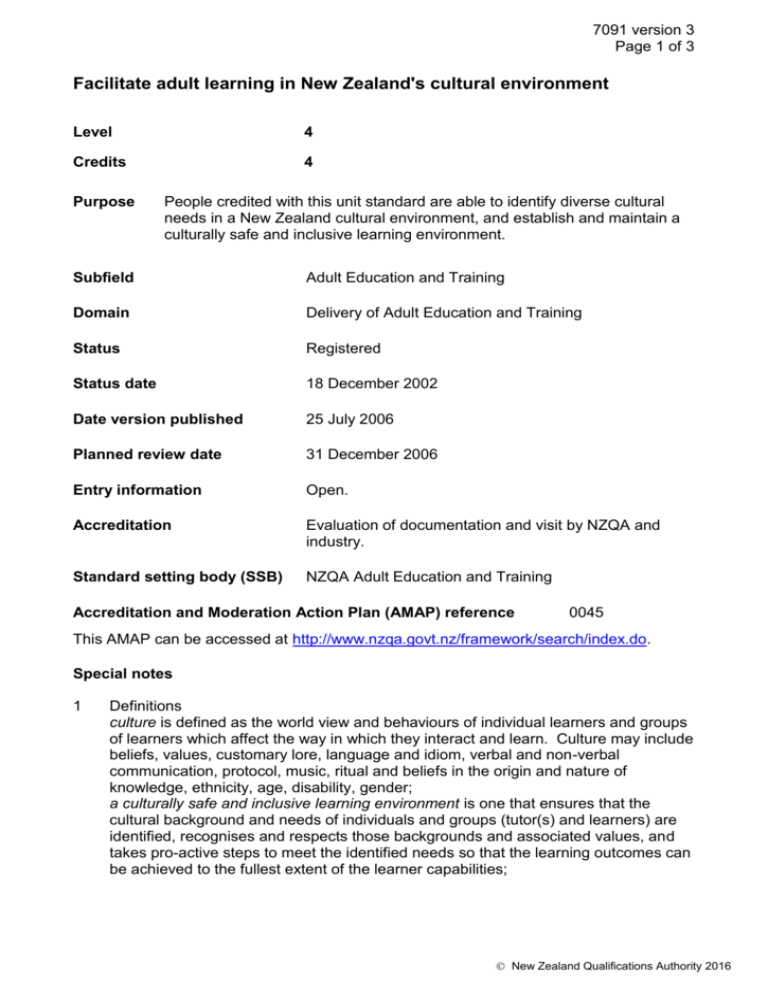
7091 version 3 Page 1 of 3 Facilitate adult learning in New Zealand's cultural environment Level 4 Credits 4 Purpose People credited with this unit standard are able to identify diverse cultural needs in a New Zealand cultural environment, and establish and maintain a culturally safe and inclusive learning environment. Subfield Adult Education and Training Domain Delivery of Adult Education and Training Status Registered Status date 18 December 2002 Date version published 25 July 2006 Planned review date 31 December 2006 Entry information Open. Accreditation Evaluation of documentation and visit by NZQA and industry. Standard setting body (SSB) NZQA Adult Education and Training Accreditation and Moderation Action Plan (AMAP) reference 0045 This AMAP can be accessed at http://www.nzqa.govt.nz/framework/search/index.do. Special notes 1 Definitions culture is defined as the world view and behaviours of individual learners and groups of learners which affect the way in which they interact and learn. Culture may include beliefs, values, customary lore, language and idiom, verbal and non-verbal communication, protocol, music, ritual and beliefs in the origin and nature of knowledge, ethnicity, age, disability, gender; a culturally safe and inclusive learning environment is one that ensures that the cultural background and needs of individuals and groups (tutor(s) and learners) are identified, recognises and respects those backgrounds and associated values, and takes pro-active steps to meet the identified needs so that the learning outcomes can be achieved to the fullest extent of the learner capabilities; New Zealand Qualifications Authority 2016 7091 version 3 Page 2 of 3 organisation policies and procedures refer to any provider, client organisation or standards setting body's documentation or reporting requirements; New Zealand’s cultural environment refers to the rich and complex cultural heritage resulting from the unique and diverse mix of people who have made this country home. It also recognises that our Māori culture sets us apart from the rest of the world and provides us with the unique flavour of being a New Zealander. 2 Delivery and assessment of adult education and training is subject to compliance with the Health and Safety in Employment Act 1992, and organisation policies and procedures. 3 Assessment of this unit standard must include knowledge of the indigenous Māori culture and at least one other culture, preferably from among those in the candidate’s learning environment. 4 Delivery and assessment of this unit standard must occur in a New Zealand cultural environment. Elements and performance criteria Element 1 Identify diverse cultural needs in a New Zealand cultural environment. Performance criteria 1.1 The tutor's own cultural needs are identified in relation to the specific learning environment. Range 1.2 Cultural needs are identified for learners of at least two cultures different from that of the tutor. Range 1.3 may include but are not limited to – values, beliefs, use of language, cultural practices, protocols, gender roles, learning styles, modes of address, personal learning development. may include but are not limited to – values, beliefs, use of language, cultural practices, protocols, gender roles, learning styles, modes of address, personal learning development. Practices that impede learning are identified. Range practices may include but are not limited to – discourteous dialogue, offensive or disrespectful behaviour, harassment. New Zealand Qualifications Authority 2016 7091 version 3 Page 3 of 3 Element 2 Establish and maintain a culturally safe and inclusive learning environment. Performance criteria 2.1 Actions are taken to foster cultural safety in the learning environment, while promoting the achievement of learning outcomes. Range may include but is not limited to – use of teaching and learning strategies, use of language, observation of cultural practice, arrangement of the physical environment, protocols. 2.2 Tutor and learner cultural behaviours that may cause barriers to learning are identified, and modified where required. 2.3 Evidence from learner feedback indicates that a culturally safe and inclusive learning environment was established and maintained. Please note Providers must be accredited by the Qualifications Authority, or an inter-institutional body with delegated authority for quality assurance, before they can report credits from assessment against unit standards or deliver courses of study leading to that assessment. Industry Training Organisations must be accredited by the Qualifications Authority before they can register credits from assessment against unit standards. Accredited providers and Industry Training Organisations assessing against unit standards must engage with the moderation system that applies to those standards. Accreditation requirements and an outline of the moderation system that applies to this standard are outlined in the Accreditation and Moderation Action Plan (AMAP). The AMAP also includes useful information about special requirements for organisations wishing to develop education and training programmes, such as minimum qualifications for tutors and assessors, and special resource requirements. Comments on this unit standard Please contact the NZQA National Qualifications Services nqs@nzqa.govt.nz if you wish to suggest changes to the content of this unit standard. New Zealand Qualifications Authority 2016
